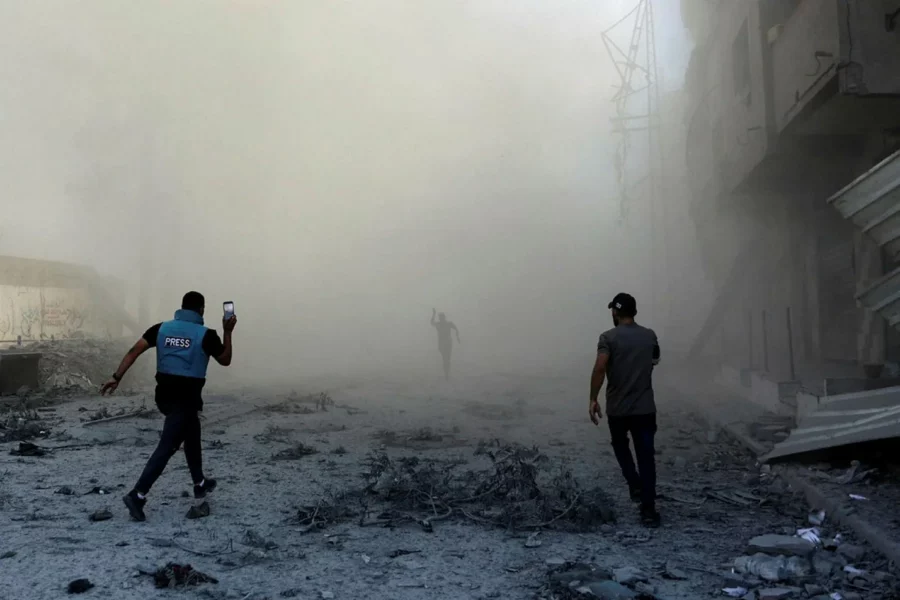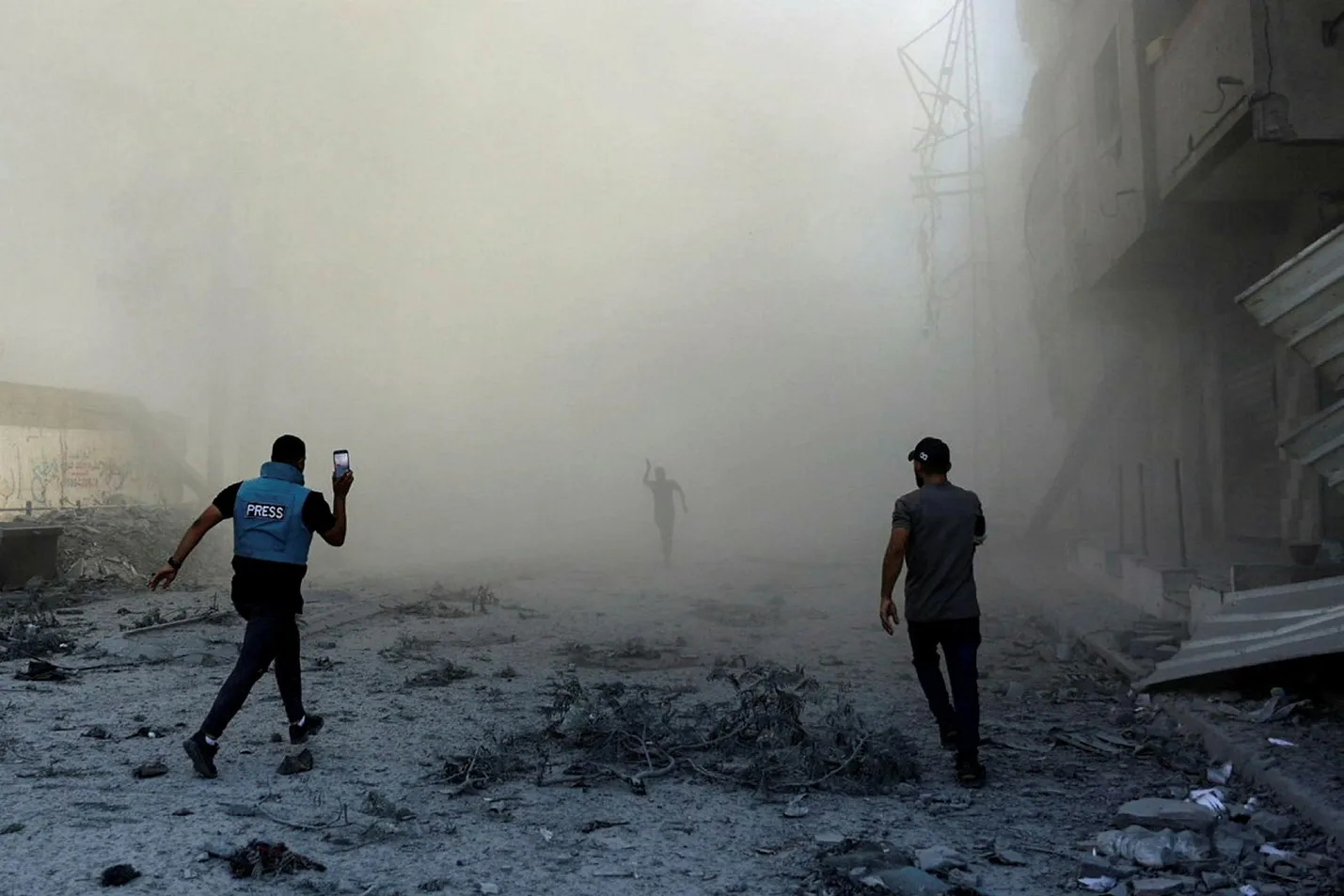 EDITRIALE
EDITRIALE
Haaretz
Tel Aviv, 11 settembre 2024
Il testo originale in inglese in fondo, dopo la tradizione in italiano
A undici mesi dall’inizio della guerra, si può affermare che i pretesti utilizzati da Israele per giustificare l’esclusione dei media da Gaza non sono più validi e che ora deve consentire l’ingresso di giornalisti stranieri affinché possano coprire la guerra in modo adeguato.
A causa del controllo israeliano sui valichi di frontiera, che è diventato ancora più stretto dopo la conquista di Rafah, nessun giornalista straniero può mettere piede nella Striscia senza l’approvazione dello Stato. Il divieto generalizzato di ingresso ai giornalisti stranieri senza la scorta dell’Unità portavoce dell’IDF danneggia enormemente la capacità di fare informazione in modo indipendente e il diritto del pubblico in Israele e nel mondo di sapere cosa sta accadendo a Gaza.
Il ruolo di un giornalista è quello di essere sul posto, di parlare direttamente con le persone e non solo attraverso i portavoce per conto di interessi acquisiti, di sentire l’atmosfera e di riferire sugli eventi. Non c’è paragone tra il reportage non mediato sul campo e quello realizzato da terzi, le interviste telefoniche e le analisi condotte con l’ausilio di immagini fisse o video.

Quando Israele impedisce ai giornalisti di recarsi a Gaza, non solo nega loro di raccontare gli orrori della guerra, ma anche di esaminare in tempo reale le affermazioni di Hamas – un chiaro interesse israeliano. Quando Israele proibisce ai giornalisti stranieri di coprire ciò che sta accadendo a Gaza, dobbiamo chiederci: cosa ha da nascondere lo Stato? In che modo trae vantaggio dal fatto che i giornalisti non entrino a Gaza?
Il risultato di impedire ai giornalisti stranieri di fare il loro mestiere è che il duro lavoro di cronaca ricade sulle spalle dei giornalisti palestinesi, che a loro volta soffrono per la guerra e le sue dure condizioni.
Secondo i dati del Committee to Protect Journalists, almeno 111 giornalisti e operatori dei media palestinesi sono stati uccisi durante la guerra (tre di loro, secondo l’esercito israeliano, militavano in Hamas o nella Jihad islamica palestinese) – il che rende ancora più urgente la necessità che altri giornalisti entrino a Gaza.
In ogni caso, proprio in tempo di guerra è molto importante permettere l’ingresso di giornalisti che non siano parte in causa nel conflitto: persone che possano coprire l’evento senza temere pressioni da parte della propria società o del proprio governo. Oggi, in tempo di guerra, quando ogni immagine rischia l’accusa di essere stata generata dall’intelligenza artificiale, il ruolo del giornalista sul campo è più importante che mai.
Non è vero che le forze armate sostengono che consentire l’ingresso di giornalisti incorporati nelle forze israeliane sia un’alternativa adeguata all’accesso indipendente. Nulla può sostituire l’accesso indipendente, in cui i giornalisti possono parlare liberamente con i residenti locali e recarsi nelle aree di interesse per il pubblico e i media.
Non possiamo accettare una situazione in cui i militari dettano la natura della copertura giornalistica. Israele deve permettere ai giornalisti di entrare nella Striscia di Gaza, in modo che tutti possano comprendere meglio ciò che sta accadendo e che la nebbia della guerra possa essere diradata, anche se solo leggermente.
Haaretz
L’articolo sopra riportato è l’editoriale principale del quotidiano israeliano Haaretz, pubblicato in ebraico e in inglese in Israele.
Vuoi contattare Africa ExPress? Manda un messaggio WhatsApp con il tuo nome e la tua regione (o Paese) di residenza al numero
+39 345 211 73 43 e ti richiameremo.
Africa Express viene diffuso in tempo reale sulla piattaforma Telegram al canale https://t.me/africaexpress
e sul canale Whatsapp https://whatsapp.com/channel/0029VagSMO8Id7nLfglkas1R
ai quali ci si può abbonare gratuitamente.
Original text in English
Editorial/Why Is Israel Afraid to Allow Foreign Journalists in Gaza? What’s It Hiding?ù
By blocking journalists from Gaza, Israel not only prevents coverage of the war’s horrors but also hinders real-time scrutiny of Hamas’ claims – a key Israeli interest
Eleven months into the war, it’s possible to say that the circumstances Israel used to justify barring the media from Gaza are no longer valid, and that it must allow the entry of foreign journalists so they can cover the war properly.
As a result of Israel’s control of the border crossings, which has become even tighter since the capture of Rafah, no foreign journalist can set foot in the Strip without the state’s approval. The blanket ban on entry to foreign journalists without an IDF Spokesperson’s Unit escort greatly damages the ability to report independently as well as the right of the public in Israel and around the world to know what is happening in Gaza.
The role of a journalist is to be on the ground, to speak directly to people and not just through spokespeople on behalf of vested interests, to feel the atmosphere and report on events. There is no comparison between unmediated reporting in the field and reporting via a third party, telephone interviews and analysis conducted with the aid of still or video images.

When Israel prevents journalists from going into Gaza it prevents them not only from reporting on the horrors of the warfare, but also from examining the claims of Hamas in real time – something that is a clear Israeli interest. When Israel prevents foreign journalists from covering what is happening in Gaza we must ask: What does the state have to hide? How does it benefit from journalists not entering Gaza?
The result of keeping foreign journalists from doing their jobs is that the hard work of reporting rests on the shoulders of Palestinian journalists, who are themselves suffering from the war and its harsh conditions.
According to data from the Committee to Protect Journalists, at least 111 Palestinian journalists and media workers have been killed during the war (three of them, according to the Israeli military, activists in Hamas or in Palestinian Islamic Jihad) – which makes the need for other journalists to enter Gaza even more urgent.
In any case, precisely during wartime there is great importance to permitting the entry of journalists who are not a party to the conflict: people who can cover the event without fear of pressure from their own society or government. In wartime today, when any image risks the accusation of having been generated using artificial intelligence, the role of the journalist in the field is more important than ever.
There is no truth to the military’s claim that allowing in journalists who are embedded with Israeli forces is an appropriate alternative to independent access. Nothing can replace independent entry, in which journalists are allowed to speak freely with local residents and travel to areas that are of interest to the public and the media. We cannot accept the situation in which the military dictates the nature of journalistic coverage. Israel must allow journalists into the Gaza Strip, so that everyone can better understand what is happening there and so that the fog of war can be cleared, if only slightly.
Haaretz
The above article is Haaretz’s lead editorial, as published in the Hebrew and English newspapers in Israel.
